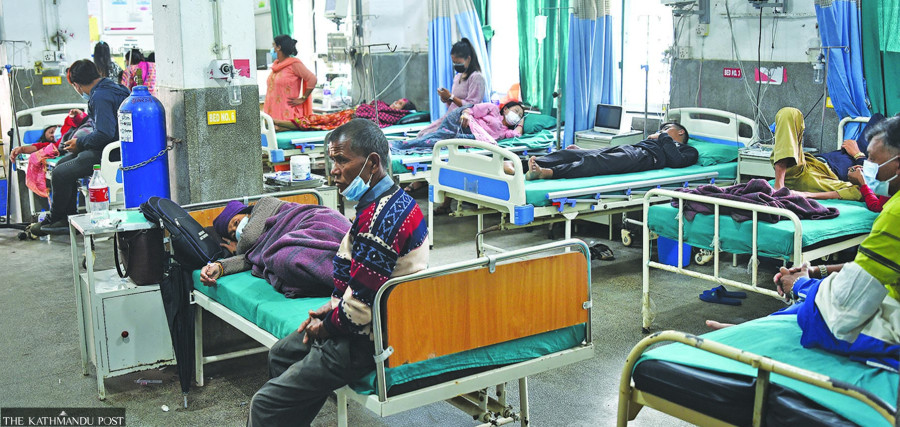Health
Possible health worker shortage during festivals may put dengue patients at risk
At least 38 people have died and over 28,000 people infected by the dengue virus that has spread to all 77 districts.
Arjun Poudel
Hundreds of people have been getting infected by dengue every day for the last few weeks as the virus spreads throughout the country.
Almost all hospitals in Kathmandu Valley have been overwhelmed by dengue patients, and even serious patients are compelled to stay at home without medication.
Public health experts have warned that infected patients are at risk of not getting treatment during the Dashain festival, as health workers may take leave.
“Unlike Covid-19, dengue infection is not new to Nepal,” said Dr Binjawala Shrestha, a public health expert. “But the authorities are not doing anything to break the chain of infection.”
According to the official data, so far, 38 people have died and over 28,000 people have been infected by the dengue virus that has spread to all the 77 districts.
Some additional deaths are being verified to confirm if infection of the virus is responsible for the fatalities, officials said.
This is the first time so many people have succumbed to this virus in Nepal. Experts closely observing the outbreak say reported cases of dengue could be just the tip of the iceberg, as around 90 percent of the infected people do not show any symptoms.
“Despite that, the infection has become widespread, leaving thousands infected and dozens dead. Authorities concerned have not taken the issue seriously,” said Shrestha. “Neither is the dengue infection a matter of international concern, nor have the national authorities taken it seriously. We didn’t learn anything from the experience of the Covid-19 pandemic.”
Dengue is a mosquito-borne disease transmitted by female Aedes aegypti and Aedes albopictus mosquitoes. The same vector also transmits chikungunya, yellow fever, and Zika viruses, according to the World Health Organisation.
Experts have warned of an increase in new cases during the festivals both in cities and in remote areas. Hundreds of thousands of people residing in big cities including in the districts of Kathmandu Valley will go to their villages to celebrate Dashain with their families.
As the vector of the dengue virus has already reached most of the districts, the risk of spread of the infection grows in remote places with poor health facilities. Doctors say that once infected, a dengue-spreading vector also infects its entire new generation. That means when a mosquito is infected, all the eggs reproduced by it will be infected too.
“Dengue search and destroy drives could be stopped and health facilities may also lack health workers [during Dashain],” said Dr Sher Bahadur Pun, chief of Clinical Research Unit at Sukraraj Tropical and Infectious Disease Hospital, Teku. “And if the municipality halts collection of garbage during the festival, the number of vectors will increase and that will obviously multiply dengue cases.”
Health Office Lalitpur said that it is aware of the risk of further spread of the virus during the Dashain festival.
“Last week we carried out a search-and-destroy drive in all the wards of Lalitpur Metropolitan City,” said Satis Bista, chief of Health Office Lalitpur. “The risk of dengue infection has not lessened and challenges are increasing. We will request the local units concerned to fulfil their responsibilities.”
The search-and-destroy campaign is found to be the most effective method to eliminate the breeding sites of dengue-spreading mosquitoes and to raise awareness among the people to take precautions.
They say that the lackadaisical approach of the authorities concerned is responsible for the rampant spread of the virus throughout the country.
Experts warn that the ongoing spread of the virus could continue until November.
Mild to high fever, severe muscle pain, rashes, severe headache, and pain in the eyes are some of the symptoms of dengue, according to doctors. Dengue cases have been detected every month since January. Based on the increasing number of infected people, public health experts say the virus has already become endemic.
Nepal also witnessed a major dengue outbreak in 2019 when six people died and over 17,000 were hospitalised. The outbreak, which had started in the pre-monsoon period from Dharan, spread to 68 districts.
The World Health Organisation says there is no specific treatment for severe dengue, but early detection and access to proper medical care can lower the fatality rate.
Meanwhile, the Epidemiology and Disease Control Division has asked all the health agencies concerned to continue health care services even during Dashain vacation.
Officials said that they have reminded the agencies concerned about the ongoing scourge of the dengue virus and the chances of ailing patients not getting services during the festivals.
“We held meetings at various levels with health agencies and have reminded them about the ongoing risks of dengue infection and their responsibilities,” said Dr Chuman Lal Das, director of the division. “We hope that all agencies concerned under different levels of governments [federal, provincial and local] would fulfil their duties and responsibilities during the festive time.”




 9.83°C Kathmandu
9.83°C Kathmandu















